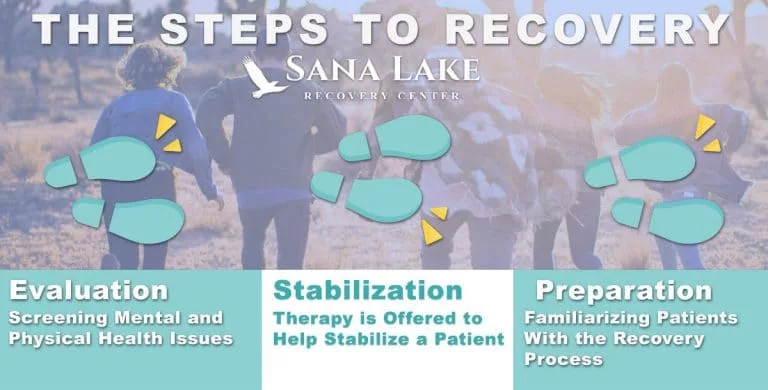Treatment Programs
Treatment Methods
The clinical staff is also prepared to assist members that may be suffering from co-occurring disorders, such as anxiety and bipolar disorder. In many cases, disorders can occur as a result of substance use disorder.

Our treatment method follows three crucial steps:
- Evaluation: This is also called the intake process. Here we screen a patient’s mental and physical health issues through blood tests and learn about their medical and psychiatric history through a comprehensive evaluation.
- Stabilization: Doctors offer psychological and medication therapies to stabilize the individual.
- Preparations of Treatment Program: Doctors familiarize our members with the treatment process and what to expect at our facility.
Oftentimes, it can be difficult to know which treatment options are most effective. We will help determine which available treatment methods will best match your individual treatment needs.
Our treatment methods used to treat substance use disorder include:
- Detox
- Inpatient Residential Treatment
- Partial Hospitalization (PHP)
- Intensive Outpatient Program (IOP)
- Sober Living
- Mental Health
- Medication-Assisted Treatment
Generally, detox or detoxification refers to a process in which toxins are removed from the human body. When detoxing from a substance use disorder (SUD), the term refers to the specific period that the body is given to process any alcohol and drugs in the system. The process aims to remove the toxic influence that drugs can have on the individual.
Sana Lake Recovery Center provides numerous detox programs and provides a range of options that will match every member’s needs.
- Safely clear their body from unwanted and harmful substances
- Manage acute withdrawal symptoms
- Offer ongoing substance disorder treatment for individuals who have opted for detoxification
The best treatment option depends on the type of substance a person has been using and their current physical dependence level. In regards to alcohol, alcohol detox is the first step for treating alcoholism. During this phase, medical professionals completely flush out alcohol from the body.
The withdrawal symptoms of this phase typically subside within two weeks once the treatment starts. Symptoms of withdrawal from alcohol include insomnia, anxiety, headaches, nausea, and sweating.
In addition to alcohol detox, drug detox is also done for those with addictions to drugs such as prescription opioids, heroin, or cocaine. We also offer a medication-supervised detox treatment plan to help patients boost their recovery. We also provide therapy plans to prevent relapses in the future.
Our medical staff of doctors, psychiatrists, and nurse practitioners will ensure a medically safe and comfortable environment for withdrawal management. Additionally, they will put focus on general physical and mental health to ensure the well-rounded recovery of each member.
Unfortunately, millions of people throughout the United States are continuing to be affected by substance use disorders. Countless individuals are struggling with alcoholism and drug dependence. Families are constantly being exposed to the pain that comes with addiction.
Drug and alcohol use disorders are both very serious problems. Sometimes, individuals who struggle with these issues may have trouble ending substance use in their lives because of their environment.
For example, an individual who suffers from an addiction problem may be enabled by a friend or significant other. Or, perhaps the individual’s family members are also dealing with a substance use disorder. As a result of the person’s environment, it can be hard for him or her to break free from the bondage of addiction.
Residential treatment is one of the main treatment approaches to help those who are suffering from substance use disorder. Patients in residential treatment live at the facility and receive care 24 hours a day, every day.
This form of treatment is extremely structured. Inpatient treatment is not a permanent living arrangement, but it does offer people a temporary safe haven while they are working to rebuild their life from drug and alcohol use.
Residential treatment includes attending individual and group therapy sessions. Therapy will help equip individuals with the necessary life, coping, and prevention skills. These skills are necessary to recover long-term and prevent the chance of relapse.
A partial hospitalization program, also known as PHP, is designed for people experiencing a mental health or co-occurring disorders. These programs facilitate patients who have the stability and support to stay at their home in the evening. This program also offers medical assistance to promote the recovery process and prevent a regular inpatient stay.
Patients who enroll in a PHP to get the treatment may suffer from various conditions as well as substance use disorder. These disorders include anxiety, depression, or bipolar disorder.
The average length of stay for someone in our PHP program is individualized to each patient. An intensive set of psychosocial and pharmacological services are provided in a setting that offers intermediate structure and supervision. Services are conducted daily, and most often, a minimum of 40 hours are offered each week. On-site supportive housing may be available with this level of care.
Members enrolled in our PHP program will recover under a full team of licensed professionals in addition to our medical staff. Those enrolled will also have a Substance Use Counselor to help them get started in their program. This support ensures they stay on track with a plan for relapse prevention, trigger identification, and emotional response stabilization.
Additionally, a Community Support Specialist will help with a transition plan. They will also help you maneuver your way through society by finding resources or helping with issues related to your community.
Depending on the treatment needs of each patient, PHP at Sana Lake Recovery Center has the following options:
- Individualized therapy
- Group therapy
- Medication management
- Family therapy.

Intensive Outpatient Program (IOP)
Intensive Outpatient Program (IOP) is a treatment program that is recommended if the therapist or doctor believes the patient doesn’t need detox or round-the-clock supervision. The treatment is typically used to address any addiction issues. It can also be used to address co-occurring disorders such as eating disorders or depression.
For IOP, the length of stay for treatment is individualized to each patient. An intensive set of psychosocial and pharmacological services are provided in a setting that still accommodates home and works life. Anywhere from 9-12 hours of services are offered each week.
Unlike the residential treatment program, IOP treatment plans enable patients to live a normal, independent, and healthy life while continuing their day-to-day tasks.
Our unique program offers a well-rounded approach to outpatient treatment. We employ a team of professionals to support every aspect of a person’s life. Our Member Care Specialists will provide safety, support, camaraderie, and direction to help make the treatment experience easier.
Our Peer Support Specialists, who are certified by the state of Missouri, will offer support, hope, and connection with others. They also provide guidance, a sense of belonging, as well as motivation, to continue treatment and ongoing recovery.
Outpatient Treatment
Outpatient treatment at Sana Lake Recovery is an excellent treatment option for those individuals who need addiction treatment, with the flexibility to manage their day to day responsibilities. Treatment and therapy are performed outside of a person’s job and family life. At the end of the day, the individual will sleep in their own bed.
Outpatient treatment is often not advised for those that have been suffering from a long-term or severe addiction. This is because there is so much flexibility in this plan. People often have a hard time sticking with it if they are not within the facility. However, anyone who is dedicated to recovery can benefit from an outpatient treatment program.
In most outpatient programs, you are offered therapy options of between 4-8 hours a day, with a total of around 20 hours a week. However, at Sana Lake Recovery Center we customize our program for each of our members that are enrolled in outpatient treatment.

Sober Living
All too often, people who complete a treatment program are left wondering, what now? In many of these situations, individuals feel ill-equipped or unprepared to make the shift from life in rehab back to “real” life.
During treatment, your life is mainly based around learning to live without substance use disorder. You develop relapse prevention strategies and gain a deeper understanding of yourself and your personal needs.
Through therapy and counseling, you develop new ways to approach the triggers in your life and work through the difficult moments. But, when it is time to use these methods and approaches in life, many individuals struggle.
For some, the main reason for this difficulty is a lack of preparation from their treatment program. Your treatment facility needs to understand the challenge of shifting from treatment to normal life.
Individuals who have completed residential and even outpatient treatment may have a hard time. Working their way back into busy work schedules, family responsibilities, schoolwork, and so forth can be challenging.
At Sana Lake, we are committed to helping people find support throughout the transitional period. This is done with the help of several dedicated staff members.
Mental Health
Unfortunately, those who are suffering from mental health disorders often develop substance use disorders as well, and vice versa. For many instances, it is difficult to determine which disorder caused which. According to a 2014 report from the National Institute on Drug Abuse (NIDA), nearly 8.4 million adults in the United States were dealing with co-occurring disorders.
When this happens, it means that the individual is living with co-occurring disorders (multiple disorders that affect a person at the same time).
When it comes to getting treatment for co-occurring disorders, it’s important to gain an understanding of the various illnesses. It’s also important to understand how they can affect people who are also dealing with substance use disorder.
Addiction develops as a result of several different factors. Sometimes, addiction develops because of genetics or certain environmental influences. Often, mental health disorders are partially responsible for addiction in people’s lives.
In many instances, struggling with mental health may lead individuals to become addicted to medications, alcohol, or illicit drugs. This is why treatment should work to deal with both mental health disorders and substance use disorders.
We understand this truth here at Sana Lake Recovery Center. That’s why we provide treatment that deals with addiction as well as any accompanying disorders. Our members receive extensive mental health care to help them to work through each disorder and find complete recovery.


Medication-Assisted Treatment (MAT)
Medication-assisted treatment works by using a variety of medications that counteract the uncomfortable withdrawal symptoms that people often go through in detox.
Once a person becomes dependent upon alcohol or drugs, stopping such substances will cause withdrawal symptoms. Drugs and substances will have different symptoms and timelines, depending on their particular interactions with the brain and body.
Detoxing from alcohol or drug use can be difficult, and coupling it with overcoming a mental health disorder, can make the process complicated.
Going through withdrawal symptoms can be hard, and depending on the addiction and level of severity, your doctor or healthcare provider may suggest medication-assisted treatment.
Medication-assisted treatment, or MAT, is when medications are used in conjunction with counseling and behavioral therapies. This method is useful in the treatment of opioid use disorders and can assist people with sustaining recovery.
The FDA has approved three drugs for opioid dependence:
- Buprenorphine: Used for the management of pain that is severe enough to require an opioid analgesic and when other treatments aren’t working.
- Methadone: An opioid medication that reduces withdrawal symptoms in people addicted to narcotics without the “high” that is associated with drug addiction.
- Naltrexone: An opioid antagonist that is a synthetic version of oxymorphone. Naltrexone hydrochloride completely blocks the effects of opioids that are intravenously administered.
All of these treatments have shown to be safe and effective when combined with counseling and psychosocial support.
Addiction Treatment at Sana Lake Recovery Center
There are many resources and information available about addiction and treatment, but oftentimes, it is hard to know what sources to trust. Most importantly, when it comes to getting treatment for substance use disorder, many people are unsure about where to start. It can be difficult to know where to begin when you are looking for a way to change your life for the better.
Thankfully, the addiction specialists here at Sana Lake Recovery Center in Dittmer, Missouri are here to help guide you on a path to recovery.
Addiction is a Disease: Are You At Risk?

Many people who engage in the use of alcohol or drugs are also at risk for developing substance use issues and addiction. In other words, the disease either develops due to pre-existing risk factors or brought on by continued substance use. Other addiction risk factors include:
- Certain brain characteristics can make someone more vulnerable to addictive substances than the average person
- Psychological factors (i.e., stress, personality traits, depression, anxiety, eating disorders, and other mental health disorders)
Addiction does not discriminate, as people of all ages, races, genders, ethnicities, or socioeconomic statuses are affected. Having one or more of these addiction risk factors does not mean someone will become addicted, but it does mean the odds become greater. The more risk factors present, the greater the chance that an individual will develop the disease.
How Does Addiction Develop and Affect You?
People who are experiencing chronic pain, for instance, are only focused on one thing, how they can get rid of the pain, and what will do it the quickest. Therefore, in hopes of long-term relief, they resort to taking strong prescription painkillers (opioids) or drinking.
Oftentimes, even though the addictive tendencies of these drugs are well-known, people tend to ignore that factor, as they just want relief. Before they know it, they start becoming dependent on these substances more and more.
Regardless of how someone became addicted, it has been scientifically proven, that substance use and addiction cause damaging effects to the brain and body, and their ability to function properly. This disease also affects all aspects of one’s life, including health, relationships, work, school, etc.

Breaking the Stigma of “Choice”
However, addiction is a disease that possesses a person, essentially taking over their conscience.
As mentioned before, in the case of a substance use disorder, the brain, and the body are being severely controlled. Individuals with an addictive personality oftentimes exhibit unruly behavior, causing them to become out of control, and do unstable things, resulting in serious consequences.
Despite these serious consequences that often occur, people with addiction issues continue to use. This is because their body becomes so dependent on these substances and simply cannot function without it.
In addition to substance dependency, an individual’s tolerance to the drugs and alcohol increases. Eventually, the body craves the substance more and more. As a result, a person’s system begins to go through severe withdrawals. This causes symptoms of nausea, anxiety and depression, fatigue, and more.
The consequences of untreated or undiagnosed addiction often include other physical and mental health disorders that require medical attention. If left untreated over time, addiction becomes more severe, disabling, and life-threatening. Therefore, finding help and treatment as soon as possible is the best option for optimal recovery, and most importantly, saving lives.
This is a disease that requires ongoing treatment and management. No one can fight the power of addiction alone. Although there is no specific cure for addiction, there are various effective treatment methods. There are many ways to manage the disease, and most importantly, take back control of your life.
As mentioned before, addiction is a chronic disease very similar to diabetes and cancer. The best way to treat addiction long-term is through disease management. This consists of therapies, support groups, and medications.
It is important to note, that without these effective forms of treatment and disease management methods, the probability of relapse is extremely high. Our ultimate goal is to provide the path of recovery and reduce the rate of relapse.
At Sana Lake Recovery Center, we aim to serve and assist anyone who is suffering from a substance use disorder (SUD). This is why we offer treatment to young adults, senior adults, men, and women.
We also offer resources that can help those who have struggling loved ones. For instance, children of individuals who suffer from SUDs can find hope and help here at Sana Lake.
Individuals who suffer from the following substance use disorders can receive the help they need through professional treatment here at Sana Lake:
- Alcohol
- Amphetamines
- Heroin
- Benzodiazepines
- Illicit Drugs
- Opiates
- Prescription Drugs
- Hallucinogens
Don’t Wait! Call Today for Addiction Treatment
If you or your loved one would like to seek treatment for a substance use disorder, take the first step today. Speak with one of our representatives, by contacting us here. We are committed to helping you take back control of your life today!




